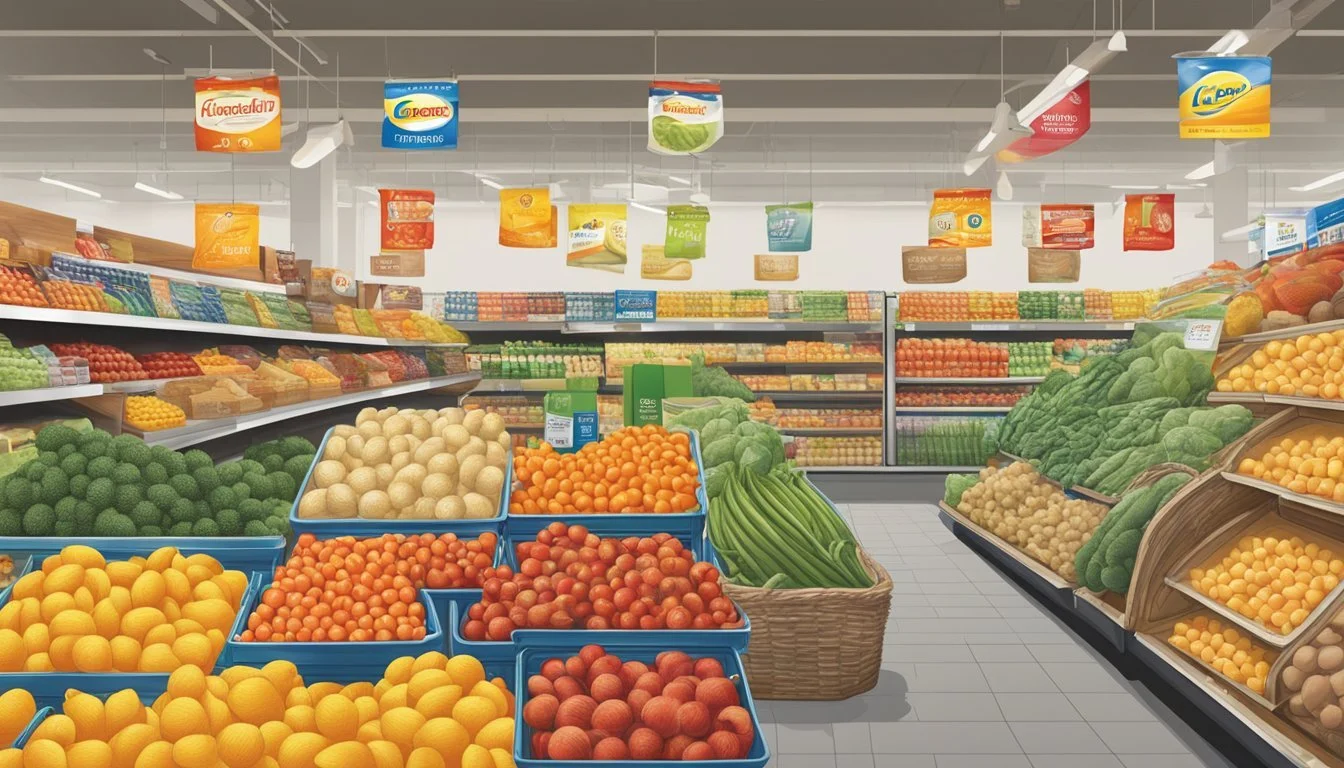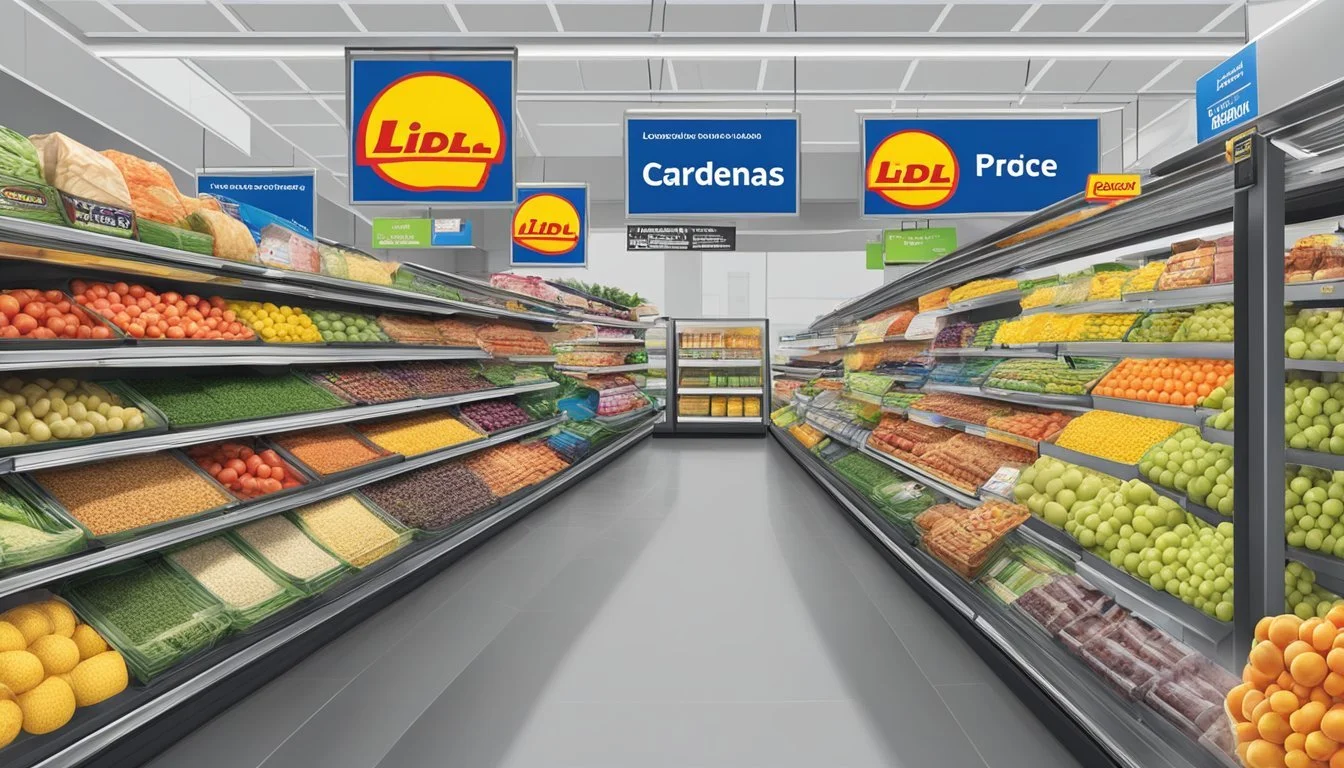Is Cardenas Markets Cheaper Than Lidl?
A Price Comparison of Two Budget-Friendly Grocery Chains
Cardenas Markets and Lidl are two grocery chains catering to different market segments. Cardenas specializes in Latin American cuisine and products, while Lidl offers a mix of European and American goods. Both stores aim to provide value to their customers, but their pricing strategies and product selections differ.
Cardenas Markets generally has higher prices than Lidl for comparable items. This is due to Cardenas' focus on specialty Latin American products and fresh produce, which often come at a premium. Lidl, on the other hand, employs a discount model with a limited selection of mostly private-label products, allowing for lower prices across the board.
Shoppers looking for authentic Latin American ingredients and prepared foods may find Cardenas Markets worth the extra cost. The chain offers a wide variety of specialty items that may not be available at Lidl. Those prioritizing overall savings on everyday grocery items will likely find better deals at Lidl, especially on non-perishable goods and household essentials.
Overview of Cardenas Markets
Cardenas Markets is a prominent Hispanic supermarket chain specializing in Latin American cuisine. The company has grown from a single store to dozens of locations across multiple states, offering a wide range of authentic products and fresh foods.
History and Expansion
Cardenas Markets was founded in 1981 by Jesús and Luz Cárdenas in Ontario, California. The couple, originally from Jalisco, Mexico, started with a single grocery store catering to the Hispanic community. Over the years, Cardenas expanded steadily across California, Arizona, and Nevada. As of 2024, the chain operates 65 stores under the Cardenas Markets brand and seven stores under the Los Altos Ranch Markets name. This growth has positioned Cardenas as a significant player in the Hispanic grocery market, serving diverse communities with a focus on quality and authenticity.
Store Departments and Specialties
Cardenas Markets is known for its extensive selection of Latin American products and fresh foods. The stores feature a meat department offering traditional cuts and prepared items like carnitas. A tortilleria produces fresh tortillas daily. The bakery, or panadería, creates authentic Mexican pastries and breads. Cardenas is renowned for its prepared foods section, serving hot meals including tacos, birria, and a variety of salsas. The produce department stocks a wide range of fruits and vegetables common in Latin American cuisine. Many stores also include a kitchen area where customers can enjoy freshly made meals on-site. Cardenas prides itself on providing high-quality, authentic ingredients for traditional recipes.
Profile of Lidl
Lidl is a German-owned discount supermarket chain known for its low prices and efficient store operations. The company has rapidly expanded across Europe and into international markets, offering a streamlined shopping experience with a focus on quality private-label products.
Global Presence and Market Strategy
Lidl operates over 11,000 stores in 32 countries, primarily in Europe but also in the United States. The company's expansion strategy focuses on entering new markets with a consistent store format and product offering. Lidl aims to attract budget-conscious shoppers by keeping operating costs low and passing savings on to customers. The retailer competes directly with other discount chains like Aldi, as well as traditional supermarkets, by emphasizing value and quality.
Product Range and Store Layout
Lidl's stores feature a compact, efficient layout designed for quick shopping trips. The product range includes:
Fresh produce
Bakery items
Meat and dairy
Packaged groceries
Household essentials
Lidl emphasizes its private-label brands, which account for about 90% of its product range. These house brands offer quality comparable to national brands at lower prices. The stores also feature a rotating selection of limited-time special buys, including non-food items like clothing and home goods. This mix of everyday essentials and seasonal deals helps drive customer traffic and repeat visits.
Price Comparison Fundamentals
Comparing supermarket prices involves analyzing pricing policies and promotional strategies. These factors significantly impact overall costs for shoppers.
Pricing Policies
Supermarkets employ various pricing approaches to attract customers. Everyday low pricing aims to offer consistently competitive rates. High-low pricing alternates between regular prices and periodic discounts. Some stores use a tiered system with different quality levels at corresponding price points.
Loyalty programs often provide members with exclusive discounts. Many chains now offer digital coupons through mobile apps. Price matching policies allow customers to get the lowest advertised price from competitors.
Seasonal fluctuations affect produce prices throughout the year. Store brands typically cost less than national brands for similar products. Bulk pricing offers savings on larger quantities of non-perishable goods.
Discount and Promo Strategies
Weekly ads highlight temporary price reductions on select items. These often feature loss leaders - popular products sold at or below cost to drive store traffic. Digital circulars make it easy to browse deals before shopping.
Buy one, get one free (BOGO) offers provide savings on duplicate purchases. Percentage discounts reduce prices by a set amount. Bundle deals group related items at a lower total cost.
Clearance sections offer deep discounts on overstocked or seasonal merchandise. Flash sales provide limited-time deals, often promoted through email or social media. Some stores run periodic customer appreciation events with storewide markdowns.
Rebate programs offer cash back on qualifying purchases. Manufacturers' coupons can be combined with store discounts for maximum savings. Price comparison apps help shoppers find the best deals across multiple retailers.
Cardenas Markets' Customer Value
Cardenas Markets prioritizes delivering value to customers through fresh, high-quality produce and strong community connections. The company's focus on cultural relevance and affordable pricing sets it apart in the competitive grocery landscape.
Quality of Fresh Produce
Cardenas Markets takes pride in offering an extensive selection of fresh fruits and vegetables. The company sources produce from over 500 vendors, ensuring a diverse and high-quality assortment. Customers can find both common and specialty items, catering to various culinary preferences.
Produce departments feature vibrant displays of seasonal fruits and vegetables. Many stores have in-house tortillerias, producing fresh tortillas daily. This commitment to freshness extends to the meat and seafood sections, where customers can find cuts suited for traditional Hispanic recipes.
Cultural Connection and Community Engagement
Cardenas Markets fosters a strong bond with Hispanic communities. The stores' layout and product selection reflect the cultural preferences of their target demographic. This includes offering specialty items and ingredients crucial for authentic Latin American cuisine.
The company actively engages with local communities through various initiatives. The Cardenas Markets Foundation, a separate non-profit entity, supports charitable efforts in areas served by the stores. This engagement strengthens customer loyalty and positions Cardenas as more than just a grocery store.
In-store experiences often include cultural events and food demonstrations, further cementing Cardenas' role as a community hub. The company's customer service approach emphasizes cultural understanding and bilingual assistance, enhancing the shopping experience for diverse clientele.
Lidl's Cost-Effectiveness
Lidl has built a reputation as a budget-friendly grocery store, offering competitive prices on a wide range of products. The German-based retailer employs several strategies to keep costs low while maintaining quality.
Pricing Strategy and Affordability
Lidl consistently ranks among the cheapest supermarkets in price comparison studies. In June 2024, Lidl was the second most affordable option, with a basket of 65 popular groceries costing £121.31, just £2.90 more than Aldi. The retailer achieves these low prices through efficient operations and a focus on private-label products.
Lidl's pricing strategy extends to fresh produce and meat. Vegetables and chicken are often priced competitively, making Lidl an attractive option for budget-conscious shoppers. The store's weekly specials and rotating stock of limited-time offers provide additional savings opportunities.
European Influence on Product Selection
Lidl's European roots influence its product selection, offering customers a unique mix of local and international items. This approach allows the grocery store to differentiate itself while maintaining cost-effectiveness.
The retailer's European-style bakery provides fresh bread and pastries at affordable prices. Lidl also stocks a variety of German and other European specialty products, often at lower prices than competitors. This mix of familiar staples and international options gives shoppers value and variety without inflating costs.
Lidl's streamlined store layout and limited SKU count contribute to operational efficiency, allowing the company to pass savings on to customers. By focusing on a curated selection of high-quality, low-cost items, Lidl maintains its position as a top budget-friendly grocery option.
Geographical Influence on Pricing
Pricing strategies at grocery chains like Cardenas Markets and Lidl are significantly impacted by geographical factors. These factors include regional economic conditions, local competition, and market-specific consumer behaviors.
Regional Price Variations in the United States
Cardenas Markets operates primarily in California, Arizona, and Nevada, with its headquarters in Ontario, California. These states have diverse economic landscapes, affecting pricing strategies. California's higher cost of living may lead to slightly elevated prices compared to Arizona or Nevada.
In contrast, Lidl's presence in different regions can influence local pricing dynamics. Studies show that when Lidl enters a new market, nearby chains often lower their prices to remain competitive. This effect is particularly noticeable with staple items like milk.
Regional variations in supply chain costs and local regulations also play a role in pricing decisions. For example, transportation expenses may differ between California's coastal cities and inland areas of Arizona.
Local Competitive Landscape
The competitive environment in specific locations greatly influences pricing strategies for both Cardenas Markets and Lidl. In areas with multiple grocery options, prices tend to be more competitive.
Cardenas Markets, specializing in Hispanic groceries, may adjust prices based on the concentration of Hispanic populations in different areas. This targeted approach allows them to remain competitive in their niche market.
Lidl's entry into a market often prompts local competitors to reassess their pricing. This can lead to overall lower prices for consumers in areas where Lidl operates. The impact is particularly noticeable in regions with previously limited grocery options.
Local economic factors, such as average household income and employment rates, also influence pricing decisions. Retailers may offer more competitive prices in areas with lower income levels to maintain affordability and attract customers.
Digital Presence and Market Strategy
Cardenas Markets and Lidl have distinct approaches to their online presence and marketing efforts. Both retailers leverage digital platforms to reach customers and enhance their shopping experience.
Online Shopping Options
Cardenas Markets offers online ordering through their website and mobile app. Customers can browse products, create shopping lists, and schedule pickup or delivery. The platform provides a user-friendly interface with detailed product information and pricing. Lidl's digital offerings include a mobile app for viewing weekly ads and creating shopping lists. While Lidl does not currently offer widespread online grocery shopping in the US, they have tested e-commerce options in select markets.
Promotional Outreach and Social Media
Cardenas Markets maintains active social media profiles on Facebook, Instagram, and Twitter. They share recipes, product highlights, and promotional deals. The company also sends email newsletters to subscribers with weekly specials and coupons. Lidl utilizes social media platforms to engage customers, showcase new products, and announce store openings. Their website features a "News" section with company updates and press releases. Both retailers use digital channels to promote their unique offerings and build brand loyalty among tech-savvy shoppers.
Conclusion
Comparing prices between Cardenas Markets and Lidl is challenging due to limited direct data. Cardenas specializes in Latin American products, while Lidl offers a broader range of European and American items.
Lidl is known for competitive pricing on staple goods. The chain often competes closely with other discount retailers like Aldi.
Cardenas Markets may offer better value on specific Latin American ingredients and fresh produce. Their focus on Hispanic cuisine could provide savings for shoppers seeking those items.
Individual shopping habits and preferences play a key role in determining which store is more economical. Factors like location, product selection, and weekly specials impact overall costs.
To find the best deals, consumers should compare prices on their commonly purchased items at both stores. Monitoring weekly ads and taking advantage of loyalty programs can lead to additional savings at either retailer.







